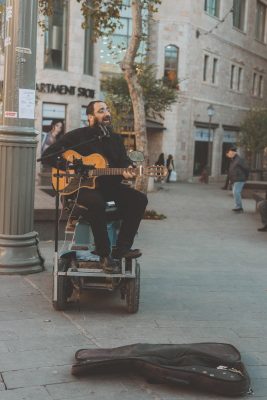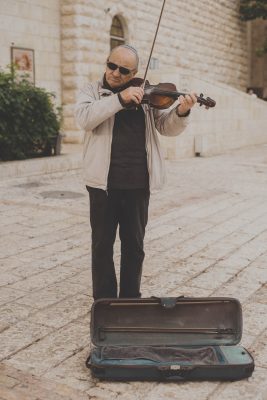
by: Peter Fast, International CEO
From the pen of CEO Peter Fast comes the ninth installment of the Quirks of Israel. Join Peter on a journey through the wonderfully peculiar culture, traditions, heritage and daily life of this singular nation as he unpacks, introduces and celebrates the quirky aspects that make Israel so wonderfully unique.
 Jerusalem is a city resounding with music. What started with King David strumming his harp has now morphed into the sounds of Israeli pop music, cantors singing as they go about their day, street performers, the odd guy belting out a song off key, professional musicians playing their violins, guitars or flutes on public squares and a host of other melodies. I would say that Israelis in general are very musical. Music is, after all, part of the Jewish DNA. From the Levitical choirs of the Temple periods to Fiddler on the Roof, Barbara Streisand and the Israel Philharmonic Orchestra, the Jewish state is a melodic gem in the Middle East. You literally hear music everywhere.
Jerusalem is a city resounding with music. What started with King David strumming his harp has now morphed into the sounds of Israeli pop music, cantors singing as they go about their day, street performers, the odd guy belting out a song off key, professional musicians playing their violins, guitars or flutes on public squares and a host of other melodies. I would say that Israelis in general are very musical. Music is, after all, part of the Jewish DNA. From the Levitical choirs of the Temple periods to Fiddler on the Roof, Barbara Streisand and the Israel Philharmonic Orchestra, the Jewish state is a melodic gem in the Middle East. You literally hear music everywhere.
I once stepped onto Jaffa Street to catch the light rail, and out-of-the-blue, a man strolling by burst into the most beautiful, operatic song, his baritone voice soaring over the rooftops. I also have fond memories of walking along Ben Yehuda Street and hearing tunes with a Russian flair, or listening to a busker expertly strumming his guitar while crooning in French. This busy thoroughfare in downtown Jerusalem also always resounds with the sound of amateur rappers, patriotic Israelis belting out Simon and Garfunkel-style folk songs and cringe-worthy techno jazz blasting from a hastily set up keyboard.
I vividly remember once making my way down Ben Yehuda Street to buy a cup of coffee when I walked past a musician serenading pedestrians with the most haunting Hebrew love song (or what I assumed was a love song). Ten minutes later—and cup of coffee in hand—I passed the same musician again. This time he was loudly belting out the famous Neil Young song, “Old Man.” I smiled to myself, thinking that Neil Young is famous even in Israel, when the musician changed his tune yet again, this time launching into Robin Mark’s “These Are the Days of Elijah.”
The Old City is the heart of Jerusalem and thus often a hub of music, singing and dance. The Municipality of Jerusalem once hosted an amazing event called, Sounds of the Old City, setting up stations throughout the Old City with professional musicians—both local and international—playing a different type of music. It was a free event, and thousands came to enjoy the tunes. The diversity was amazing. At the Tower of David Museum you had a Motown gospel jazz band. A little further, traditional Yemenite Jewish melodies filled the air. The Christian Quarter featured a phenomenal jazz soul singer, while eight musicians playing Moroccan instrumental music stood in the Cardo.
Hurva Square in the heart of the Old City is always filled with melody. I remember once passing the Hurva Synagogue on my way to the Western Wall when I noticed a Jewish gentleman sporting a lavish full beard streaked with grey. I thought to myself that he looked like a philosopher, an artist with an incredible life story, someone who had stepped straight from the Broadway set of Fiddler on the Roof.
 My thoughts had barely formed when the man took hold of a violin in his one hand, steadied the bow in his other, and proceeded to play If I Were a Rich Man—straight from Fiddler on the Roof. Many people, myself included, crowded around him to soak up every note of the melody. It was a magical moment, as this distinctly Jewish tune floated over the ancient white stones of the Jewish Quarter, passed the iconic Hurva Synagogue and on to the Western Wall.
My thoughts had barely formed when the man took hold of a violin in his one hand, steadied the bow in his other, and proceeded to play If I Were a Rich Man—straight from Fiddler on the Roof. Many people, myself included, crowded around him to soak up every note of the melody. It was a magical moment, as this distinctly Jewish tune floated over the ancient white stones of the Jewish Quarter, passed the iconic Hurva Synagogue and on to the Western Wall.
Speaking of the Western Wall…The area surrounding the holiest spot in Judaism is a whole different ball game. This is big-leagues, the blow-your-mind, life-changing stuff. Here, anything can happen. When it comes to the beauty of the music to be heard here, there are no rules. If you think you’ve heard incredible music, witnessed impassioned dancing or family, friends and perfect strangers joining hands to bounce up and down to the rhythm of a lively tune, think again. It is at the Western Wall where music and dancing are made. You have to keep in mind though that it’s a different type of music. You won’t get rock bands or secular groups belting out their creations there. But you’ll see thousands of people knitted together as a family singing and praying in choruses that stir the soul.
On a High Holy Day or a Sabbath, your heart will come alive with emotions as the most beautiful songs resound from the crowd. The highlight probably comes right after the end of Yom Kippur (Day of Atonement), when 25 hours of fasting and repentance culminates in the most joyous dancing and singing you have ever seen. It doesn’t matter who you are, you will literally be pulled into a massive mass of spinning, rejoicing Israelis. I know I have—and it was amazing!
Be at the Western Wall during a bar or bat mitzvah (religious coming-of-age ceremony for young Israelis) as a casual observer and you’ll hear the most beautiful Scriptures and prayers set to melody. Or take the time to linger at the Western Wall during Passover to hear an unrehearsed choir of thousands singing the Hallel (Psalms 113–118). The music that resounds in praises and petitions to God at the Western Wall are simply beyond words.
So, when you travel to Israel, make sure to pay attention to the music. Stop, listen and soak it all in. You will hear it everywhere, especially in Jerusalem. And if you do, I can promise you that it will bring a smile to your face, warm your heart and feed your soul.
Israel is indeed beautifully and melodiously quirky.
Photo Credit: Click on photo for photo credit
All logos and trademarks in this site are property of their respective owner. All other materials are property of Bridges for Peace. Copyright © 2025.
Website Site Design by J-Town Internet Services Ltd. - Based in Jerusalem and Serving the World.